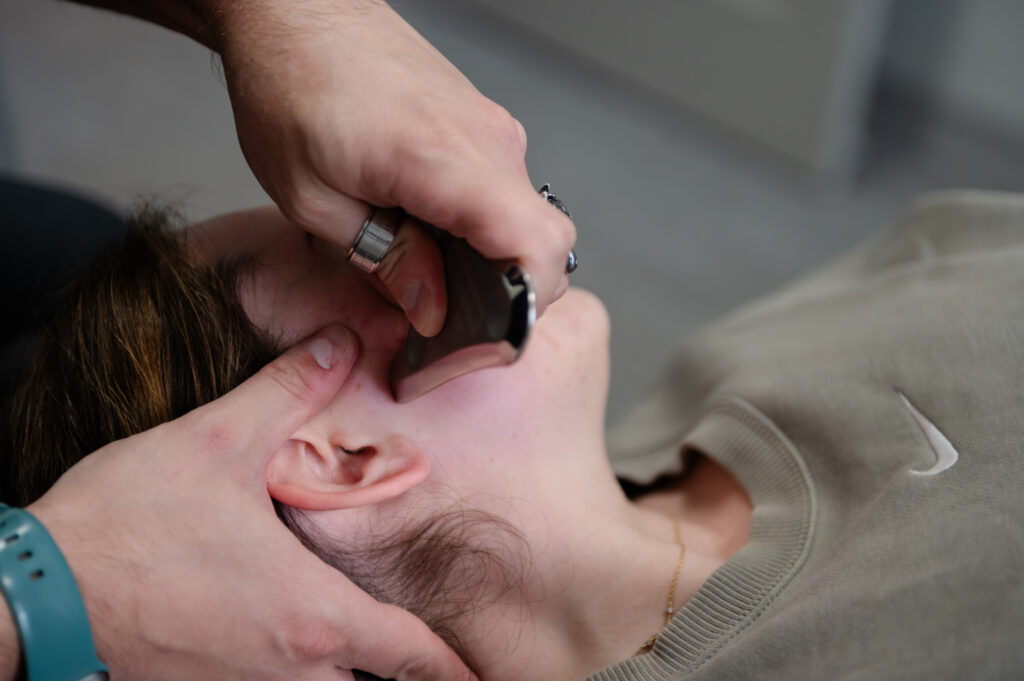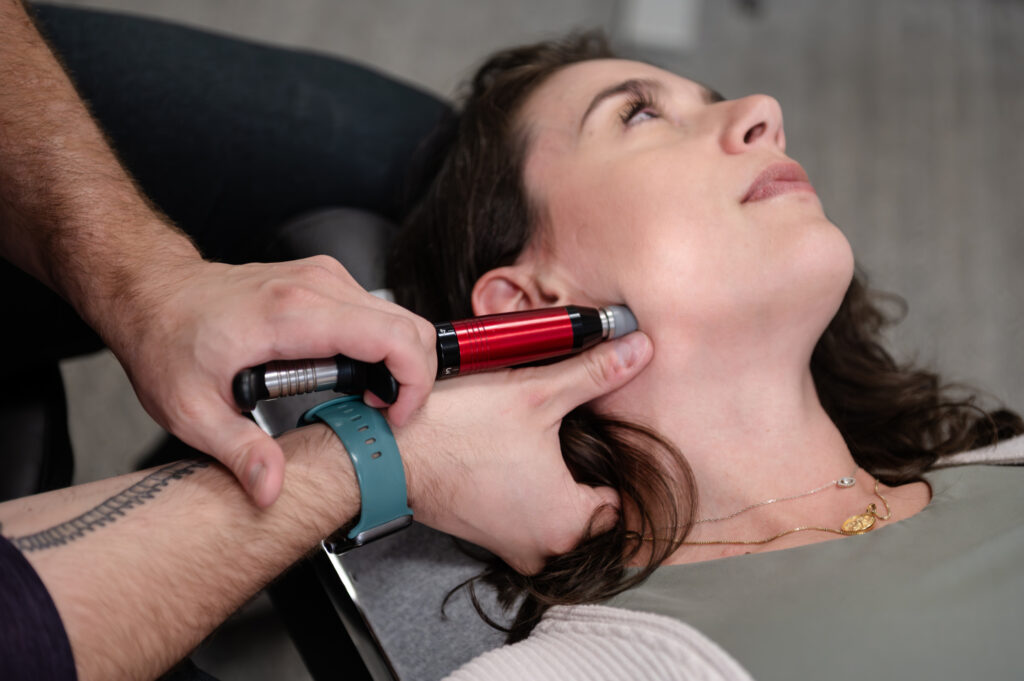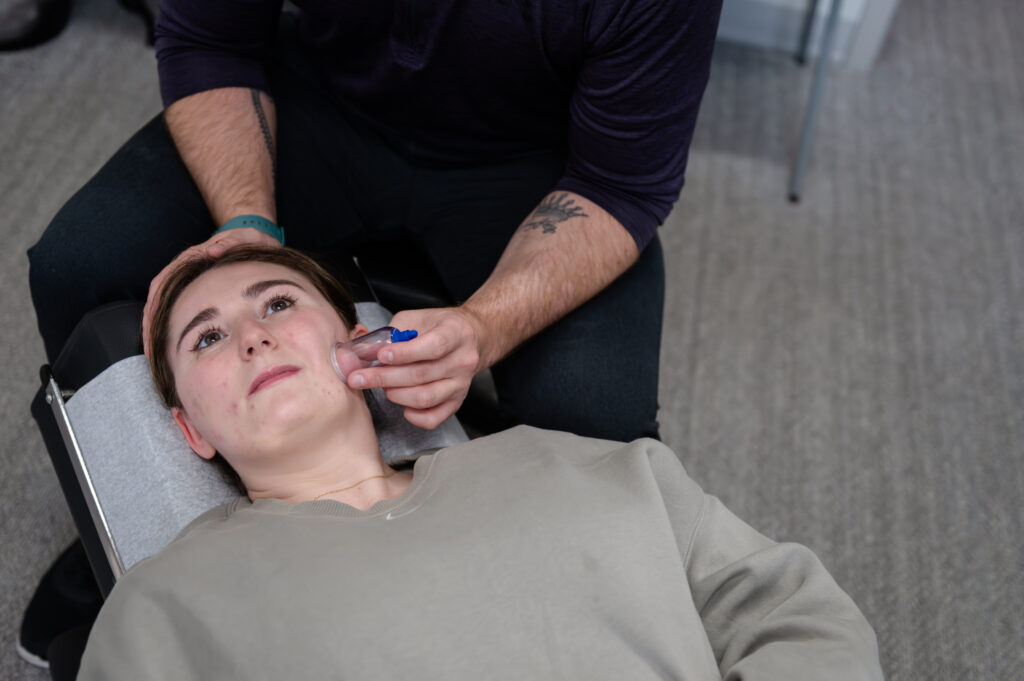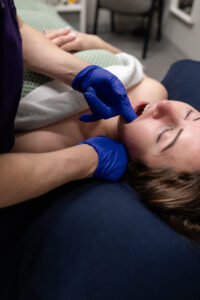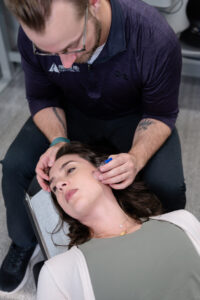TMJ DYSFUNCTION
Temporomandibular Joint Dysfunction (TMJD) can cause persistent jaw pain, headaches, difficulty speaking or chewing, jaw locking and even neck and shoulder discomfort. At Pinnacle Hill Chiropractic, we take a strategic approach to treating TMJD, addressing the root cause of your discomfort to restore function and improve your quality of life.
The Power of Chiropractic Care for TMJ Dysfunction
Chiropractic care and massage therapy play a valuable role in managing TMJD by addressing joint restrictions, muscle dysfunction, and movement imbalances. Because the jaw is closely connected to the neck and spine, tension and mobility restriction in these areas can contribute to dysfunction and pain. Effective treatment goes beyond spinal manipulation – soft tissue therapy, jaw mobilization techniques, and rehabilitative exercises can improve jaw function and provide relief from TMJ pain.
Benefits of Chiropractic Care for TMJ Dysfunction
- Reduces jaw pain and tension
- Improves jaw mobility and function
- Relieves headaches and facial discomfort
- Addresses neck and shoulder tightness related to jaw dysfunction
- Minimizes clicking, popping, or locking of the jaw
- Supports long-term relief through corrective care
Prevention-Focused Care
TMJD symptoms often stem from posture, stress, teeth grinding (bruxism), or previous injuries. Our prevention-focused approach helps patients identify and address these contributing factors through corrective exercises, ergonomic recommendations, and stress management techniques.
Common Symptoms of TMJ Dysfunction
- Jaw pain and tenderness
- Clicking or popping sounds in the jaw
- Lockjaw or difficulty opening/closing the mouth
- Headaches, ear pain, or facial discomfort
- Neck and upper back tension
- Teeth grinding (bruxism) and clenching
- Difficulty eating firm foods
- Deviation of the jaw when opening or closing the mouth
Causes of TMJ Dysfunction
- Muscular Dysfunction
- Joint Dysfunction
- Headaches
- Neck Tension
- Stress
- Clenching & Grinding
- History of Braces
- Oral Surgery
- Nail biting
Who Can Benefit from TMJD Treatment?
TMJD treatment is beneficial for:
- Individuals experiencing jaw pain or dysfunction
- Those with headaches or neck pain related to jaw tension
- People with a history of TMJ injury or dental work
- Anyone struggling with nighttime teeth grinding or clenching
- Patients seeking a drug-free, conservative approach to pain relief
Our Treatment Approach
We begin with a thorough evaluation of your jaw, neck, and posture to identify movement restrictions, muscle imbalances, and contributing factors to your TMJD symptoms.
Targeted Treatment
In our office, TMJD treatment may include:
-
- Gentle jaw manipulation and mobilization to improve jaw and cervical spine alignment
- Spinal manipulation to improve mobility in the neck and upper spine, addressing restrictions that may contribute to jaw dysfunction
- Soft tissue therapy to relieve muscle tension, trigger points, and tightness in the jaw, neck, and surrounding structures
- Cupping therapy to reduce muscle tension and improving blood flow to affected areas
- Rehabilitative exercises to improve jaw movement, strengthen supporting muscles, restore normal function, and prevent reoccurrence
- Lifestyle modifications for long-term relief including sleep, diet and stress management
- Referral to a Massage Therapist with advanced training in TMJD to relax the neck, shoulder, and jaw
By combining these evidence-based approaches, chiropractic care and massage therapy can help restore optimal jaw movement and alleviate discomfort.
Additionally, we may recommend working with your dentist to see if any oral appliances are appropriate for aiding in your recovery from TMJD.
Techniques & Modalities We Use
- Chiropractic adjustments for the jaw, neck, and upper back
- Myofascial release and soft tissue mobilization
- Instrument-assisted soft tissue therapy
- TMJ-specific exercises and rehab techniques
- Postural correction strategies
Meet Our Providers
Our experienced providers specialize in treating musculoskeletal conditions, including TMJD. We take a patient-centered approach to ensure personalized, effective care.
Dr. James Walters is dedicated to a patient-centered approach and to diagnosing and treating complex musculoskeletal conditions including TMJD. He combines advanced techniques with personalized care plans to address the root causes of pain and improve overall wellness.
Jacqueline Zimmer, LMT specializes in therapeutic massage techniques that target chronic pain, tension, and postural imbalances. Her integrative approach helps patients manage TMJD discomfort by improving muscle function and reducing jaw-related stress.
Schedule Your TMJD Assessment Today
Don’t let jaw pain or TMJD impact your daily life. Book your TMJD assessment with one of our providers today and take the first step toward relief!
Frequently Asked Questions About Temporomandibular Joint Dysfunction
For additional information, please refer to our Patient Information page.

